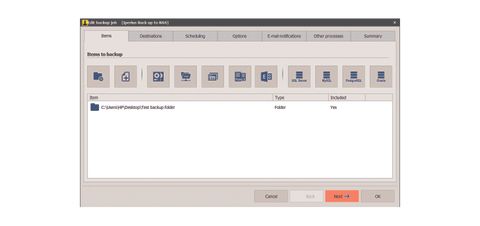IT Pro Verdict
Pros
- +
Fast
- +
Great hybrid backup options
- +
Low-to-nonexistant costs
Cons
- -
Irksome UX design
- -
Limited scheduling tools
- -
No disk imaging
Iperius Backup comes in two domestic editions: the standard Desktop version costing €29 (around £26) and this free edition, which is lighter on features but still perfectly viable for personal use. If you find its restrictions holding you back, registering the software unlocks a 21-day trial of the paid-for package, so you can see if that better fits your needs. Whichever version you choose, the front-end is the same.
Its flat grey and navy design looks business-like, and as you start creating your first backup job you’ll see buttons for some very corporate features such as Hyper-V and SQL Server backup. Needless to say, these are inactive unless you buy a license for the Advanced VM version - but it’s irksome that Iperius doesn’t visually indicate which features are included in your current edition.
The icons themselves can be a little cryptic too, so there’s a sense of having to feel your way around at first. In fact, your only options are to add folders and files to your backup set, as disk imaging isn’t included in the free edition.
The scheduling tool is also fairly ordinary: you can’t create complex routines with multiple triggers, but you can set backup intervals from one minute to one month, as well as configure email notifications to alert you to any errors.
Where Iperius excels is in its hybrid backup options: for each job you can define as many destinations as you want, and apply individual compression and backup chain settings to each one. The free client only supports local paths as destinations, but paid-for editions can connect directly to FTP servers and to Iperius’ own cloud storage service, which starts at €39 a year for 50GB.
Backups are stored as direct duplicates of the original files and folders, which makes Iperius Backup pretty quick – it took just 25 seconds to copy the 2GB test folder to our USB drive. If you enable compression, you can either have each item compressed into an individual ZIP file or wrap the entire backup into a single archive. It’s a simple and transparent approach, but it means that there’s no easy way to browse old versions.
In all, Iperius Backup Free has local file backups well-covered: the major missing link is disk imaging. You can get that by upgrading to the Desktop edition, but if you’re watching your budget you might prefer to go for Paragon’s more fully-featured and equally free backup solution instead.
Darien began his IT career in the 1990s as a systems engineer, later becoming an IT project manager. His formative experiences included upgrading a major multinational from token-ring networking to Ethernet, and migrating a travelling sales force from Windows 3.1 to Windows 95.
He subsequently spent some years acting as a one-man IT department for a small publishing company, before moving into journalism himself. He is now a regular contributor to IT Pro, specialising in networking and security, and serves as associate editor of PC Pro magazine with particular responsibility for business reviews and features.
You can email Darien at darien@pcpro.co.uk, or follow him on Twitter at @dariengs.


